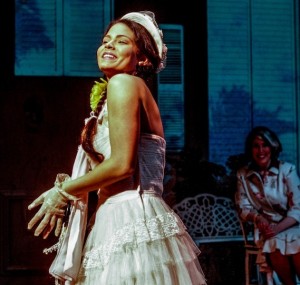The monarch never arrives, but SD Rep’s ‘Butterflies’ is commendable
It’s been attributed to just about every leader in history, and it’s lived this long because, in certain circles, it serves an exceptional purpose. “Hold your friends close and your enemies closer” is a central directive in statesmanship and warcraft, one that Generalissimo Rafael Leónidas Trujillo Molina might have called on during his brutal dictatorship of the Dominican Republic.
The axiom didn’t do him much good, as he was assassinated in a 1961 ambush—but it’s estimated that he disposed of 50,000 “enemies” during his 31-year rule, including as many as 30,000 in one massacre alone.
San Diego Repertory Theatre’s commendable In the Time of the Butterflies, an understory about four sisters’ real-life resistance, complements Julia Alvarez’s bestselling 1994 novel and a 2001 feature film and TV movie of the same name. The Caridad Svich play adaptation, in its English-language world premiere here and running at the Space venue through Jan 26, charts the Maribal girls’ paths as catty teenagers, living life “as if the world will never come to an end,” to seasoned veterans of Trujillo’s repression. Svich gives generous time to the women’s deep sense of family, and her characters are nicely disparate, including that of sister Dedé, who dismayingly chooses the low road amid Trujillo’s bloodlust.
But it seems to me that for all its lushness, the show is missing an honest-to-God antagonist, leaving maverick Minerva without an enemy to hold closer, or indeed at all. Her declarations against the state tended to fall on my deaf ears—without that crucial embodiment of her family’s misery, the show can at times lose something in the translation.

Maria Teresa Maribal (Maritxell Carrero) makes a fashion statement as sister Dede (Catalina Maynard) looks on.
Photo by Daren Scott.
It falls to surviving sister Dedé (given name Bélgica) to recount the family’s happier days, which date to 1938, the year strongman Trujillo named a figurehead leader. Maria Teresa (Maritxell Carrero), not quite 15, is the family’s wannabe clotheshorse—her dream wardrobe includes thousands of shoes—just as bookish, driven Minerva (Jacqueline Grace Lopez) is intent on a career in law. Years later, chatty banter about boys and the sisters’ abiding love for their farmer father (Culture Clash co-founder Herbert Siguenza, who helms here with Rep associate artistic director Todd Salovey) has given way to news of wholesale disappearances, repression of civil liberties and slayings of suspected radicals. From there, Minerva rebuffs Trujillo’s advances at a party with a slap, placing her family in danger.
The tension culminates in Minerva’s and Maria Teresa’s imprisonment and torture on several occasions, along with the seizure of sister Patria’s (Elisa Gonzales) property. Despite the generalissimo’s best efforts, the women remain unbowed in their efforts to effect his overthrow. In 1960, they and Rufino, their innocent driver, were butchered for their trouble, their bodies thrown off a cliff in their Jeep to make the murders look like an accident (as Rufino, Siguenza delivers one of the finest super-short performances it’s been my privilege to witness).
But it’s hard to sympathize with the sisters because their enemy (Siguenza again) is virtually unseen and grossly underdeveloped all evening. The guy has probably five minutes’ face time, mostly spent hitting on Minerva; and his advances are more oafish than villainous. Except for innuendo and second- and thirdhand news, the girls’ unfettered radicalism and humanity have almost nothing to play against. Trujillo’s ghastly methods of repression make the gap all the more conspicuous.
Meanwhile, an excellent ensemble culture carries the girls’ performances. The quartet’s alarm over the state of the country is urgent without becoming shrill, and Dedé‘s decision not to participate in the movement is handled with deft sisterliness. Catalina Maynard’s older Dedé has the right gentility, although Dedé‘s revelations sometimes seem gimmicky amid the introduction of an American journalist (Sandra Ruiz, who also plays young Dedé).
“Writers are all we have,” older Dedé laments as she details the events—so what does that make the well-intentioned Svich? Stage manager?
Composer Michael Roth’s mini-anthems track well with Ericka Aisha Moore’s ultra-modern choreography, Kristen Swift Hayes’ adaptable lights and Ian Wallace’s articulate set and projections. Anastasia Pautova’s costumes are fine, although some of their color schemes come dangerously close to tipping the characters’ developmental hands.
Lopez is an exceptionally beautiful woman, and the fire in her eyes belongs only to a character like her Minerva. Trujillo has met his match in Minerva, and he knows it—it’s a mystery why Svich, an award-winning UCSD MFA grad, doesn’t write him accordingly. Still, this piece is a well-executed, highly theatrical nod to an inglorious time in the modern West, where it’s tough to distinguish the friends from the enemies even now.
‘Hold your friends close and your enemies closer’ is a central directive in statesmanship and warcraft…

Martin Jones Westlin, principal at editorial consultancy Words Are Not Enough and La Jolla Village News editor emeritus, has been a theater critic and editor/writer for 25 of his 47 years…
More…


